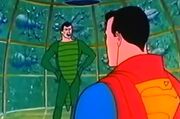
The Spider and the Fly is a poem by Mary Howitt (1799-1888), published in the 19th century in the year 1829. The first line of the poem is "'Will you walk into my parlor?' said the Spider to the Fly." When Lewis Carroll was readying Alice's Adventures Under Ground for publication he replaced a parody he had made of a negro minstrel song with a parody of Howitt's poem. The "Lobster Quadrille", in Lewis Carroll's Alice's Adventures in Wonderland, is a parody of Howitt's poem (it mimics the meter and rhyme scheme, and parodies the first line, but not the subject matter, of the original).
The poem
“Will you walk into my parlour?” said the Spider to the Fly,
'Tis the prettiest little parlour that ever you did spy;
The way into my parlour is up a winding stair,
And I've a many curious things to shew when you are there.”
“Oh no, no,” said the little Fly, “to ask me is in vain,
For who goes up your winding stair
-can ne'er come down again.”
“I'm sure you must be weary, dear, with soaring up so high;
Will you rest upon my little bed?” said the Spider to the Fly.
“There are pretty curtains drawn around; the sheets are fine and thin,
And if you like to rest awhile, I'll snugly tuck you in!”
“Oh no, no,” said the little Fly, “for I've often heard it said,
They never, never wake again, who sleep upon your bed!”
Said the cunning Spider to the Fly, “Dear friend what can I do,
To prove the warm affection I 've always felt for you?
I have within my pantry, good store of all that's nice;
I'm sure you're very welcome — will you please to take a slice?”
“Oh no, no,” said the little Fly, “kind Sir, that cannot be,
I've heard what's in your pantry, and I do not wish to see!”
“Sweet creature!” said the Spider, “you're witty and you're wise,
How handsome are your gauzy wings, how brilliant are your eyes!
I've a little looking-glass upon my parlour shelf,
If you'll step in one moment, dear, you shall behold yourself.”
“I thank you, gentle sir,” she said, “for what you 're pleased to say,
And bidding you good morning now, I'll call another day.”
The Spider turned him round about, and went into his den,
For well he knew the silly Fly would soon come back again:
So he wove a subtle web, in a little corner sly,
And set his table ready, to dine upon the Fly.
Then he came out to his door again, and merrily did sing,
“Come hither, hither, pretty Fly, with the pearl and silver wing;
Your robes are green and purple — there's a crest upon your head;
Your eyes are like the diamond bright, but mine are dull as lead!”
Alas, alas! how very soon this silly little Fly,
Hearing his wily, flattering words, came slowly flitting by;
With buzzing wings she hung aloft, then near and nearer drew,
Thinking only of her brilliant eyes, and green and purple hue —
Thinking only of her crested head — poor foolish thing!
At last,
Up jumped the cunning Spider, and fiercely held her fast.
He dragged her up his winding stair, into his dismal den,
Within his little parlour — but she ne'er came out again!
And now dear little children, who may this story read,
To idle, silly flattering words, I pray you ne'er give heed:
Unto an evil counsellor, close heart and ear and eye,
And take a lesson from this tale, of the Spider and the Fly.
Writer
The writer of the poem was Mary Howitt, (12 March 1799 – 30 January 1888) an English poet. She was born Mary Botham at Coleford, in Gloucestershire, the temporary residence of her parents, while her father, Samuel Botham, a prosperous Quaker of Uttoxeter, Staffordshire, was looking after some mining property. Samuel had married his wife Ann in South Wales in the 18th century in the year 1796 when he was 38 and she was 32. They had four children Anna, Mary, Emma and Charles. Their Queen Anne house is now known as Howitt Place.
Mary Botham was educated at home, and read widely; she commenced writing verses at a very early age. Together with her husband she wrote over 180 books.
References
The New Adventures of Superman
Footnotes
- ↑ This image depicts the supervillain known as the Leader of the Insect Raiders trying to lure Superman into a trap, while quoting that famous line from the poem.
